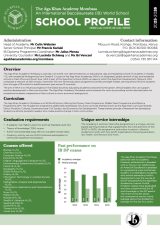Student experience at 2016 Peace Summit
The Peace Summit is an annual event conducted over a period of two days by the DP1 cohort for Year 9. It is one of the most actively student-driven events at AKA Mombasa. Preparation for the Peace Summit begins well in advance, with DP1 students starting to work on their modules since August last year. The main aims of this Peace Summit were to make us believe that peace is possible, empowering us to be leaders, showing us how to work together to resolve conflicts, and devising sustainable solutions to global issues. The main theme of this year’s Peace Summit was Conflict Over Resources, and our first activity at the Peace Summit was the Hunger Banquet.
The Hunger Banquet was an activity where Year 9 students were divided into three groups; low-income, middle-income, and high-income. Each group was treated differently according to their socioeconomic status. The poor people were given boiled rice, the middle class was served cake, and the rich people were provided with a proper breakfast. We were all in a place where we could clearly observe how the other groups were being treated. The Hunger Banquet was a very accurate depiction of our world today - less than one percent of the global population being rich, and the majority being poor. After this activity we concluded that the cycle of poverty affects generations and is really hard to escape. Also, the rich people group was only able to help a small number of poor people, which showed how the rich don’t have a large-scale impact on alleviating poverty. The Hunger Banquet was an amazing introduction as it made us think of sustainable solutions to breaking out of the cyclical nature of poverty – which was what the Peace Summit was mainly about.
We had two guest speakers come in during the Peace Summit to enhance our knowledge; the Manager of Facebook in Kenya, and a member of the COBURWAS. The Manager of Facebook in Kenya, Naheed Hirji, talked about how the internet can be used as a tool to create peace if used in the right manner, and how it has previously been used to destroy peace. He talked about the ways the world has improved due to technological advancement and also discussed the pros and cons of the internet. Our second guest speaker, Joseph Munyambanza, was a Congolese person who had lived in Uganda for most of his life and had worked in refugee camps on providing children education for a brighter future. He enlightened us with his journey and explained how his programmes help children in acquiring quality education. The two speeches were of great benefit to us, as they educated us about real-life attempts to create peace.
During the modules of the Peace Summit, we talked about different crises around the world and proposed possible solutions to them. We used many case studies such as – Coltan mining in DRC, and the water crises between Tajikistan and Uzbekistan. We talked about all sorts of things during these modules, analyzing each of these situations in-depth and suggesting better solutions for each issue. The Peace Summit provided us with a platform to debate current issues, propose solutions for them, and also reflect on them critically. These two days greatly helped us realize how privileged we are to have all the resources we do and to live in an environment much safer than many children who are currently suffering. It also made us believe that we can make a change, no matter how small – it will definitely impact the world in one way or another. We are all part of this world and we all contribute to the problems of the world in a positive or negative manner – so let’s make it positive and work on resolving the problems in our world. Let’s Make A Change!
--Tabreek Somani, Year 9 (The Reporters)





